Top Boy: The show like nothing else on TV
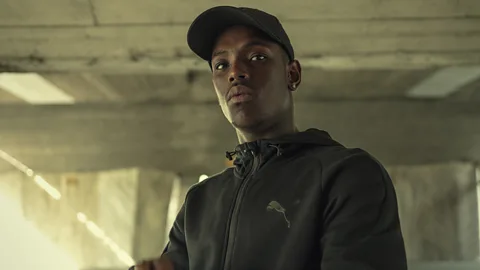 Chris Harris/Netflix
Chris Harris/NetflixThe British version of The Wire won plaudits – and then was cancelled. Now it’s back, after being rescued by the rapper Drake. Sarah Hughes gives it five stars.
Television audiences across the world tend to have a set idea of British TV. It’s the home of posh people gliding through immaculately decorated period sets dropping acid bon mots from their half-closed mouths. It’s twisty crime dramas with dark edges and plentiful cliffhangers or anarchic and strangely sad comedies in which just about anything might or will go. What it rarely is it is the sort of raw, believable and authentic story that accurately reflects the reality of life for many in the UK today. This is where Top Boy comes in.
When it first aired on the British TV network Channel 4 in October 2011 Ronan Bennett’s series, directed with energy and flair by French-Algerian director Yann Demange (who would go on to make the equally tense ’71), felt like a welcome jolt to the complacency of much other UK drama.
Set on a fictional housing estate in East London’s Hackney, the show detailed the efforts of two young men – Dushane (Ashley Walters) and Sully (Kane ‘Kano’ Robinson) – as they attempted to gain control of the estate’s drug trade even as their actions put their friendship under impossible strain.
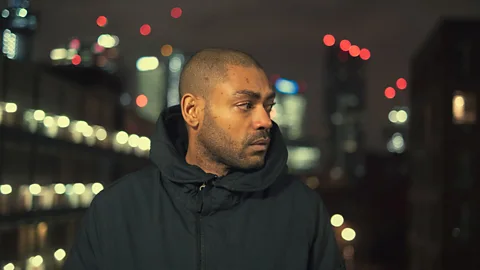 Chris Harris/Netflix
Chris Harris/NetflixWalters and Robinson’s performances turned them into stars, but what made the show so important was its refusal to rely solely on their charisma. Instead, creator Ronan Bennett had a wider story to tell – in addition to Dushane and Sully we met the troubled Ra’Nell (Malcolm Kamulete), a young teen increasingly struggling following his mother’s sectioning; spent time with Turkish gangs as they attempted to muscle in on the trade; and met those who wanted to get in on the life, those who rejected it and those who just wanted to survive the daily grind.
A dark, beautifully paced and ultimately devastating second series built on the sense that here was a show truly prepared to pin a way of life to the page. Its authenticity was bolstered by the use of local teens in key roles and a grime-filled soundtrack that felt like the music you heard blasting from headphones on the streets every day.
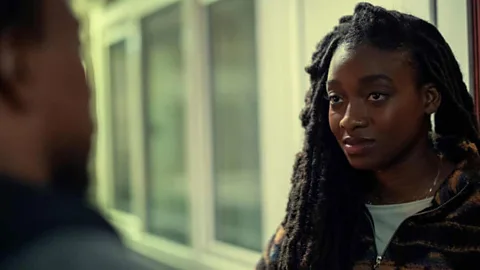 Chris Harris/Netflix
Chris Harris/NetflixPlaudits swiftly followed. In a review of the final episode of that series, I compared it to David Simon’s critically acclaimed The Wire and it’s a comparison I stand by. No other show on British TV has so ambitiously attempted to tell the story of a community whose voice is rarely allowed to be heard. The stage should have been set for a triumphant third series, and one of those moments when a beloved cult series breaks out to become the only thing that anyone is talking about. Instead, Channel 4 cancelled it.
“It was very difficult, very disappointing,” its Bennett, describing the network’s decision as “a kick in the teeth”. “Because I’d seen the impact the show had the community – we had a young cast filled with people who were not often represented on TV and who were all very excited about the kind of opportunities that might only come their way once in a lifetime and for that to be pulled away from them was terribly sad.”
Second chance
Thankfully an unlikely saviour was waiting in the wings. Canadian rap superstar Drake turned out to be a huge fan and a third series has just launched on Netflix. “Drake’s been like the gasoline to our fire, enabling us to get the show back,” says Bennett, adding that the rapper otherwise took a creatively hands-off producing role. Netflix commissioned a 10-episode third series, which “allowed the space to really explore the world and take the time we needed to tell the stories in far more detail”.
So what should long-time fans and intrigued newcomers expect? First, and most importantly, while allowing for a bigger budget, the move to the streaming giant has cost the show none of its raw appeal. From the opening moments, when the camera pans over the Hackney and Dalston streets, to the sounds of man-of-the-moment AJ Tracey, it’s clear that Top Boy is back.
 Chris Harris/Netflix
Chris Harris/NetflixWithin a few brief scenes we’ve been introduced to a new cast of strivers and dreamers trying to get by at the Summerhouse estate (notable performances include Micheal Ward as the contained Jamie, who is trying to both become Top Boy and raise his two brothers away from the life) and checked in on some familiar faces as well.
“One of the things we spent a long time discussing was the fact that Sully and Dushane would now be in their mid-30s and in roan that’s really ancient,” says Bennett. “We had to acknowledge that and then find a reason why they still might be in that life. But we also wanted to point up that ageing, to say look six, seven years have gone past what does that mean?”
Bennett was also keen to show how current events such as a looming Brexit truly impact on the daily lives of ordinary people. He began writing the third series just as the Windrush scandal broke “and I knew I had to include that… if you write something that’s very specific to time and place then you can’t avoid those references. They have to go in.”
Street smart
Similarly, there are acute scenes involving austerity, school cuts and careless middle-class drug consumption which nestle alongside more light-hearted digs at Hackney’s gentrification and instantly recognisable scenes featuring laughing teenagers shooting the breeze ahead of a night out.
The key to getting those scenes correct, says Bennett, lies in allowing the young cast a certain freedom. “I’m very conscious of being a white middle-class man so while I do the first drafts, Gerry Jackson, who’s from the community, is the script consultant. Once we’ve got a pretty good version of the dialogue the actors then workshop the scene and make changes which is very important because the last thing I would want to force them to do is say lines they were uncomfortable with.”
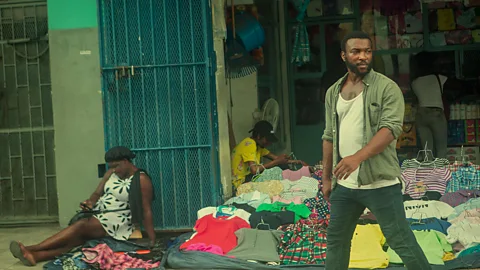 William Richards/Netflix
William Richards/NetflixBennett and his fellow producers, Charles Steel and Alasdair Flind, were also determined that the directing remained diverse. The first three episodes are shot by Reinaldo Marcus Green, director of the haunting Monsters and Men, while Nia DaCosta helmed an additional two. “Those were conscious decisions not to add yet more middle-aged white men,” says Bennett. “Similarly, with the casting – our criteria is always that the actor needs to look like they’re from the world. The people working on the show recognise the feel and the tone and really understand what they’re representing.”
That said, the new series has some eye-catching casting with key roles for rappers Simbi ‘Little Simz’ Ajikawo and David ‘Dave’ Omoregie. “I hadn’t actually heard of Dave,” its Bennett, sounding slightly shamefaced about the man whose debut Psychodrama reached Number one in the UK album chart and has been shortlisted for the 2019 Mercury Music Prize. “But Des Hamilton (the show’s casting director) is very into music and he was very aware...he’s great in the role. With Simz, Kane mentioned her and when she came in to read against Ashley [Simz plays Shelley, a local girl who has been looking after Dushane’s mother in his absence], we could see that there was real chemistry there.”
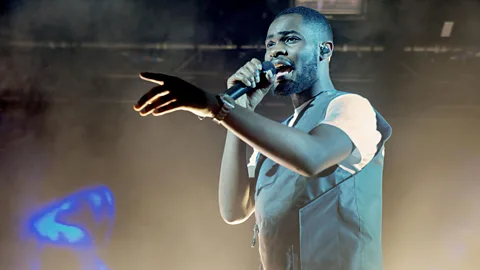 Alamy
AlamyThere is a sense, too, that this series has the balance just right between the harrowing, hard-hitting moments and the lighter moments of respite. “I’m very aware that my own propensity is to start dark and get darker,” its Bennett. “But I do think that when you’re telling tough stories you need some hope for the audience. They can’t feel like they’re being hammered over the head with every episode. That’s not to say they shouldn’t be challenged but there are also limits.”
Does he feel that the show’s resurrection might see it become a global phenomenon along the lines of other recent UK hits such as Peaky Blinders? “I just hope people think it’s worth the wait now that it’s risen from the dead. Obviously I think it is – I believe it starts strongly and that there’s no dip and I don’t think anyone will guess the ending. I suppose the one thing I’m slightly concerned about is that anyone who watches it in the first couple of days might spoil it but that’s the way in which TV is watched these days. We’re not unique in that situation.”
★★★★★
Love TV? BBC Culture’s TV fans on Facebook, a community for television fanatics all over the world.
If you would like to comment on this story or anything else you have seen on BBC Culture, head over to our Facebook page or message us on Twitter.
And if you liked this story, sign up for the weekly bbc.com features newsletter, called The Essential List. A handpicked selection of stories from BBC Future, Culture, Worklife and Travel, delivered to your inbox every Friday.
